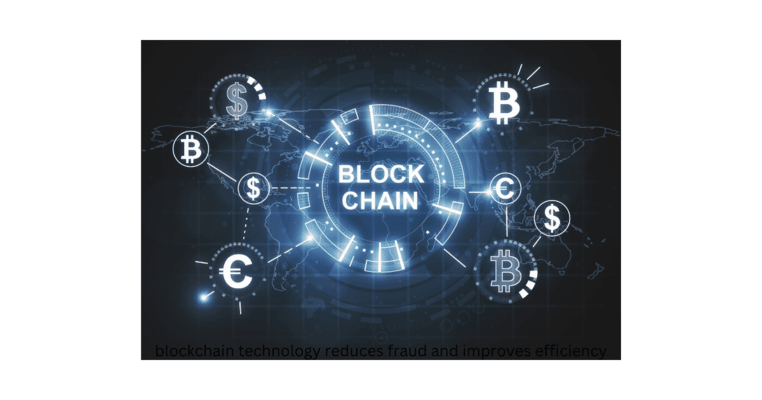Blockchain innovation has risen as a progressive drive over different businesses, blockchain technology reduces fraud and improves efficiency, advertising unparalleled security, straightforwardness, and productivity. At first, created as the fundamental innovation for cryptocurrencies like Bitcoin, blockchain has advanced into a flexible apparatus with applications past advanced monetary standards. At its center, blockchain may be a decentralized record that records exchanges over an organized of computers in a secure and unchanging way.
Understanding the Instrument of Blockchain
Blockchain works on a decentralized arrangement, disposing of the requirements for mediators such as banks or government teachers to approve exchanges. Each exchange is recorded in a “square,” which is at that point included in a chain of existing squares, shaping a chronological and straightforward record. The decentralized nature of blockchain guarantees that no single substance has control over the complete arrangement, making it safe to extortion and control.
Key Components of Blockchain Innovation or Blockchain Technology Reduces Fraud and Improves Efficiency
Decentralization:
Not at all like conventional centralized frameworks, blockchain works on an arrangement of hubs, each keeping up a duplicate of the record. This decentralized structure upgrades security and anticipates a single point of disappointment.
Cryptographic Security:
Exchanges on the blockchain are secured utilizing cryptographic procedures, making it essentially outlandish for unauthorized parties to modify or fake information.
Agreement Components:
Blockchain depends on agreement instruments such as Verification of Work (PoW) or Confirmation of Stake (PoS) to approve exchanges and keep up the astuteness of the organization.
How Blockchain Diminishes Extortion
Immutable Record Keeping
One of the foremost critical preferences of blockchain innovation is its permanence. Once an exchange is recorded on the blockchain, it cannot be changed or erased without agreement from the lion’s share of the organization. Blockchain Technology Reduces Fraud and Improves Efficiency. This includes making blockchain especially viable in combating extortion, as any endeavor to alter the information would require modifying all consequent squares, which is for all intents and purposes incomprehensible.
Straightforward Exchanges
Blockchain gives straightforwardness by allowing all members within the arrangement to see exchange points of interest in real-time. Blockchain Technology Reduces Fraud and Improves Efficiency. This straightforwardness diminishes the potential for false exercises, as any disparities can be effectively recognized and tended to by the organized members.
Upgraded Security Measures
Blockchain utilizes progressed cryptographic methods to secure exchanges, making it profoundly safe from hacking and unauthorized get. Each exchange is scrambled and connected to the past one, making a chain of secure and irrefutable records.
Progressing Proficiency Through Blockchain
Streamlined Forms
By dispensing with middle people and robotizing forms through shrewd contracts, blockchain innovation streamlines different commerce operations, decreasing the time and assets required for manual errands. Blockchain Technology Reduces Fraud and Improves Efficiency. Keen contracts are self-executing contracts with the terms of the assertion directly written into code, empowering programmed requirements and execution of legally binding commitments.
Speedier Exchanges
Conventional money-related exchanges regularly include different mediators and long preparation times. With blockchain, exchanges can be executed specifically between parties within minutes or indeed seconds, in any case of topographical area. This productivity not as it were spares time but moreover decreases exchange costs and delays.
Upgraded Information Administration
Blockchain gives a secure and decentralized stage for putting away and overseeing information, diminishing the risk of information breaches and unauthorized get to. With blockchain, clients have more noteworthy control over their information and can safely share data with trusted parties without depending on centralized substances.
Investigating Blockchain Applications
Supply Chain Administration
Blockchain innovation revolutionizes supply chain administration by giving end-to-end permeability and straightforwardness all through the supply chain. From crude fabric sourcing to last item conveyance, blockchain empowers following and following of products at each arrangement, decreasing the chance of fake items and guaranteeing compliance with controls.
Healthcare Industry
Within the healthcare industry, blockchain improves quiet information security and interoperability among healthcare suppliers. Patients can safely share their restorative records with authorized healthcare experts, streamlining determination and treatment forms while keeping up quiet protection and privacy.

Genuine Bequest Exchanges
Blockchain streamlines genuine bequest exchanges by digitizing property records and robotizing contract execution through shrewd contracts. This diminishes the chance of extortion and disposes of the requirement for mediators, coming about in speedier and more cost-effective property exchanges.
Voting Frameworks
Blockchain-based voting frameworks offer secure and straightforward races by recording votes on an unchanging record. This avoids altering decisions comes about and enhances voter belief within the discretionary preparation, driving to more law-based and comprehensive races.
Challenges and Future Viewpoints
In spite of its various benefits, blockchain innovation faces a few challenges that have to be tended to for far-reaching appropriation. Versatility, vitality utilization, administrative concerns, and interoperability are among the key obstacles that blockchain engineers and partners are effectively working to overcome.
Adaptability
Adaptability remains a critical challenge for blockchain systems, especially in dealing with an expansive number of exchanges at the same time. Blockchain Technology Reduces Fraud and Improves Efficiency. Arrangements such as sharding, layer 2 conventions, and progressions in agreement calculations point to progress versatility without compromising security or decentralization.
Vitality Utilization
The energy-intensive nature of blockchain mining, particularly in proof-of-work agreement instruments like Bitcoin, has raised natural concerns. Endeavors are underway to investigate more energy-efficient agreement instruments like proof-of-stake and create maintainable arrangements for blockchain foundations.
Administrative Vulnerability
The administrative scene encompassing blockchain innovation changes altogether over diverse wards, creating instability for businesses and financial specialists. Blockchain Technology Reduces Fraud and Improves Efficiency. Clear and steady directions are basic to cultivate advancement while guaranteeing buyer security and compliance with lawful necessities.
Interoperability
Interoperability between distinctive blockchain systems and bequest frameworks is vital for consistent information trade and collaboration. Standardization endeavors and interoperability conventions point to bridging the hole between different blockchain stages, empowering compatibility and integration over different applications.
Future Viewpoint
Despite these challenges, the longer term of blockchain innovation looks promising, with proceeded headways and selection over businesses. From fund and healthcare to supply chain administration and the past, blockchain has the potential to revolutionize trade forms, improve straightforwardness, and cultivate belief in advanced exchanges.
Developing Patterns
Decentralized Fund (DeFi):
DeFi stages use blockchain innovation to supply decentralized money-related administrations such as loaning, borrowing, and exchanging, without the requirement for conventional mediators.
Non-Fungible Tokens (NFTs):
NFTs speak to interesting advanced resources put away on the blockchain, empowering proprietorship and provenance confirmation of advanced craftsmanship, collectibles, and other advanced substances.
Central Bank Computerized Monetary Forms (CBDCs):
Central banks around the world are investigating the issuance of computerized monetary standards on blockchain stages to upgrade installment frameworks, budgetary considerations, and money-related arrangement viability.
Conclusion
Blockchain development has risen as a game-changer in combating blackmail and updating viability over distinctive businesses. Its decentralized nature, perpetual quality, and cryptographic security make it a culminating course of action for secure and direct trades. By leveraging blockchain advancement, businesses can streamline operations, decrease blackmail, and advance by huge viability in today’s rapidly progressing computerized scene.
FAQs (Frequently Asked Questions)
How does blockchain development expect blackmail?
Blockchain advancement maintains a strategic distance from blackmail through its changeless record-keeping system, direct trades, and moved forward security measures.
What are smart contracts, and how do they contribute to adequacy?
Sharp contracts are self-executing contracts with terms particularly composed into code. They computerize shapes, lessen the requirement for center individuals, and ensure faster and more beneficial trades.
Can blockchain advancement be associated with past cryptocurrencies?
Yes, blockchain advancement has arranged applications past cryptocurrencies, checking supply chain organizations, healthcare, veritable space, and voting systems.
Is blockchain advancement fitting for small businesses?
Totally! Blockchain advancement offers benefits such as reduced costs, updated security, and streamlined shapes, making it suitable for businesses of all sizes.
How can businesses actualize blockchain development?
Businesses can actualize blockchain advancement by recognizing utilized cases, selecting fitting blockchain stages, and collaborating with experienced blockchain architects.


13 thoughts on “How Blockchain Technology Reduces Fraud and Improves Efficiency?”